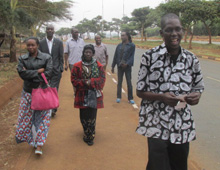Zubeida Jaffer, Shepi Mati, Frank Meintjies and Phindile Xaba
South Africa has come a long way from the dark day of October 19, 1977 when the Apartheid regime squeezed the noose tightly around press freedom.
Known as Black Wednesday, the day has appropriately become the official South African Media Freedom Day. On that day in 1977, the whites-only racist government banned 19 Black Consciousness Movement organisations and detained scores of activists. It further closed The World and Weekend World newspapers and detained the editor Percy Qoboza for five months at the Modderbee Prison under section 10 of the Internal Security Act of 1950.
Jailing journalists without trial, banning them and forcing some into exile became the order of the day. Diverse voices were suppressed and the public sphere was populated with propaganda. The media operated in a minefield of intricate laws designed to make it almost impossible to publish any information without authorisation from the government, especially on political and national security issues.
Adoption of inclusive constitution
Finally, in 1996, with the adoption of the inclusive South African Constitution, Clause 16 of the Bill of Rights elegantly broke this noose and created space for the re-centering of the age-old traditions of the lekgotla or indaba – also known as the public sphere – where everyone was encouraged to speak their minds. It further brought journalists back to the time-honoured practice of the imbongi, the person selected to praise and criticise without fear or favour to ensure the health of a community. Linked to the notion of the imbongi, and further helping to deepen our understanding of press freedom, are the roles of storyteller, griot, sanusi, truth-sayer, seer, sangoma, healer, village fool. These were people who, as part of their roles or calling, often held a mirror to the community for introspection and who spoke the truth using code, song, mime, physical expression, satire, mocking as well as symbolism and allegory.
Media Freedom
Internationally, Article 19 of the Universal Declaration on Human Rights (UDHR) guarantees the right to freedom of expression. It states: “Everyone has the right to freedom of opinion and expression; this right includes the right to hold opinions without interference and to seek, receive and impart information and ideas through any media and regardless of frontiers.”
In South Africa, the relevant clause reads:
(1) Everyone has the right to freedom of expression, which includes
- Freedom of the press and other media;
- Freedom to receive or impart information or ideas;
- Freedom of artistic creativity; and
- Academic freedom and freedom of scientific research.
(2) The right in subsection (1) does not extend to
- Propaganda for war;
- Incitement of imminent violence, or
- Advocacy of hatred that is based on race, ethnicity, gender, or religion and that constitutes incitement to cause harm.
The limitations placed on free expression in this clause blends well with the spirit of Ubuntu that does not tolerate hate speech. The grounding principle of the philosophy that a person is a person through other people stands at the core of an approach that has evolved through the centuries in this part of the world.
South Africa’s Media Freedom Day
On South African Media Freedom Day, these rights and practices are fully institutionalised and stand as a core pillar of a country that is crafting its future in the present.
They have been further concretised in our law. In Khumalo and Others v Holomisa, the Constitutional Court explained that:
“The print, broadcast and electronic media have a particular role in the protection of freedom of expression in our society. Every citizen has the right to freedom of the press and the media and the right to receive information and ideas. The media are key agents in ensuring that these aspects of the right to freedom of information are respected. The ability of each citizen to be a responsible and effective member of our society depends upon the manner in which the media carry out their constitutional mandate.”
These consolidations of free expression and media freedom have to be vigorously defended and protected. The easy spread of disinformation represents the greatest challenge currently and needs constant vigilance. Fortunately, there is considerable magnification of this challenge and through the to and fro, greater clarity of possible solutions will come with time.
Commitment to free expression
The Journalist chooses on this day to celebrate the commitment to free expression but believes that for South Africa to flourish, there must be recognition that suppression of free expression has not been the only noose placed around our necks.
Colonialism and apartheid did not only suppress free expression and silence critics but also ignored and systematically marginalised the voices of the great majority. It was as if the majority simply did not exist and their stories did not matter at all.
Buried deep within the South African psyche is a wealth of expression, including understandings and perceptions of the world and life that have been marginalised under colonialism and apartheid, that has to come to the fore and can no longer be ignored. The Journalist on these pages provides a glimpse of the richness of expression that has so long been written out of national public life. Has the time not come for us to think in new and more dynamic ways of what it means to expand the public sphere; to revisit what it means – in our context of rebuilding and restoration – to ensure it is truly place of multiple voices? Has the time not come for us to vastly extend the list of our expressive forebears and deeply enrich our current discourse with a symphony of inputs that breaks free from the constraints of recent colonial history that so colours our perspectives?










